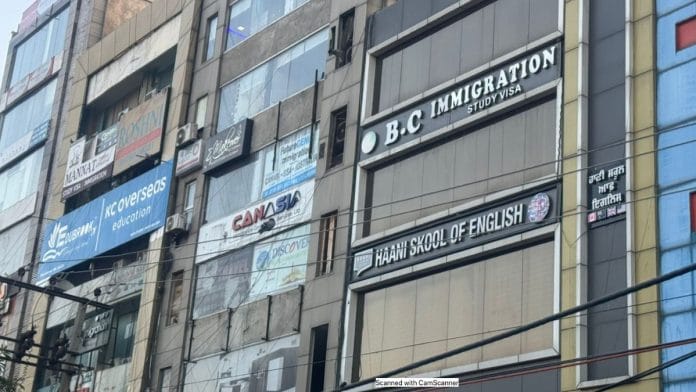Karnal/Amritsar: At 3:30 pm on Thursday, 25-year-old Shubham Rana tore out of the Kalron village in Karnal on his bike to meet the local tout. His mission: Recover the Rs 65 lakh that his father had spent on sending his brother to the US.
His 20–year-old brother Akash, who had taken the illegal ‘dunki’ route, was among the first batch of 104 illegal immigrants that the US had deported back to India. Now, the family is in debt, without the promise of American dollars.
“We told the agent that he either returns the money or we go to the police,” said Rana. And when the tout refused to return the money, he made good on his threat. On Thursday night, the Karnal police filed the first FIR against the agent, Roki Jalandhar. More complaints will come, said a local police officer.
The high-profile deportation has sent shockwaves across the immigration industry—both legal and illegal—in Haryana, Punjab, and neighbouring states. Touts are fleeing their homes, disconnecting their phones, and going underground, fearing the wrath of local residents and the long arm of the law.
Less than 24 hours after the handcuffed deportees disembarked from a US C-17 military aircraft at Amritsar airport—30 of them from Punjab and 33 from Haryana—the attention has swung to agents and their networks. The police are canvassing villages and towns, asking for names. The local khabri system is buzzing.
The dunki industrial complex stands abandoned, bewildered. Now there’s a dart on it. “Our focus should be on crackdown—strong crackdown—on the illegal migration industry,” said external affairs minister S Jaishankar during a parliamentary debate on 6 February.
Police in both states have started summoning deportees for information on the dunki route touts. Some immigration centres are scrambling to obtain legal certifications and clear outstanding taxes in an effort to keep their businesses running. And in Amritsar, even established study abroad and immigration consultancy firms are vacant. Instead of a tide of clients demanding their services, they are now being looked on with suspicion.
“Over a lakh Indians were deported when Biden was president, but it was done discreetly on chartered planes. It didn’t make big news. The public spectacle surrounding this deportation has caused widespread panic,” said Bikram Chabhal, president of the Association of Visa and IELTS Centres and operator of KBC International Immigration Services.
A series of FIRs
Touts in Karnal, Kurukshetra, Amritsar, and Panipat have switched off their cell phones to escape the clamour from angry families.
The Karnal police are tracking down Jalandhar, who has been booked under Sections 406 and 420 of the Indian Penal Code (criminal breach of trust and cheating) and under various sections of the Emigration Act, 1983.
“My brother Akash had gone to Delhi for a trip. Akash met a boy named Sandeep… He said, If you want to go abroad, I will give you the number of the agent… The agent told his name as Roki Jalandhar and we talked for 42 lakh 50 thousand rupees to send my brother Akash abroad,” read Shubham Rana’s account in the FIR.
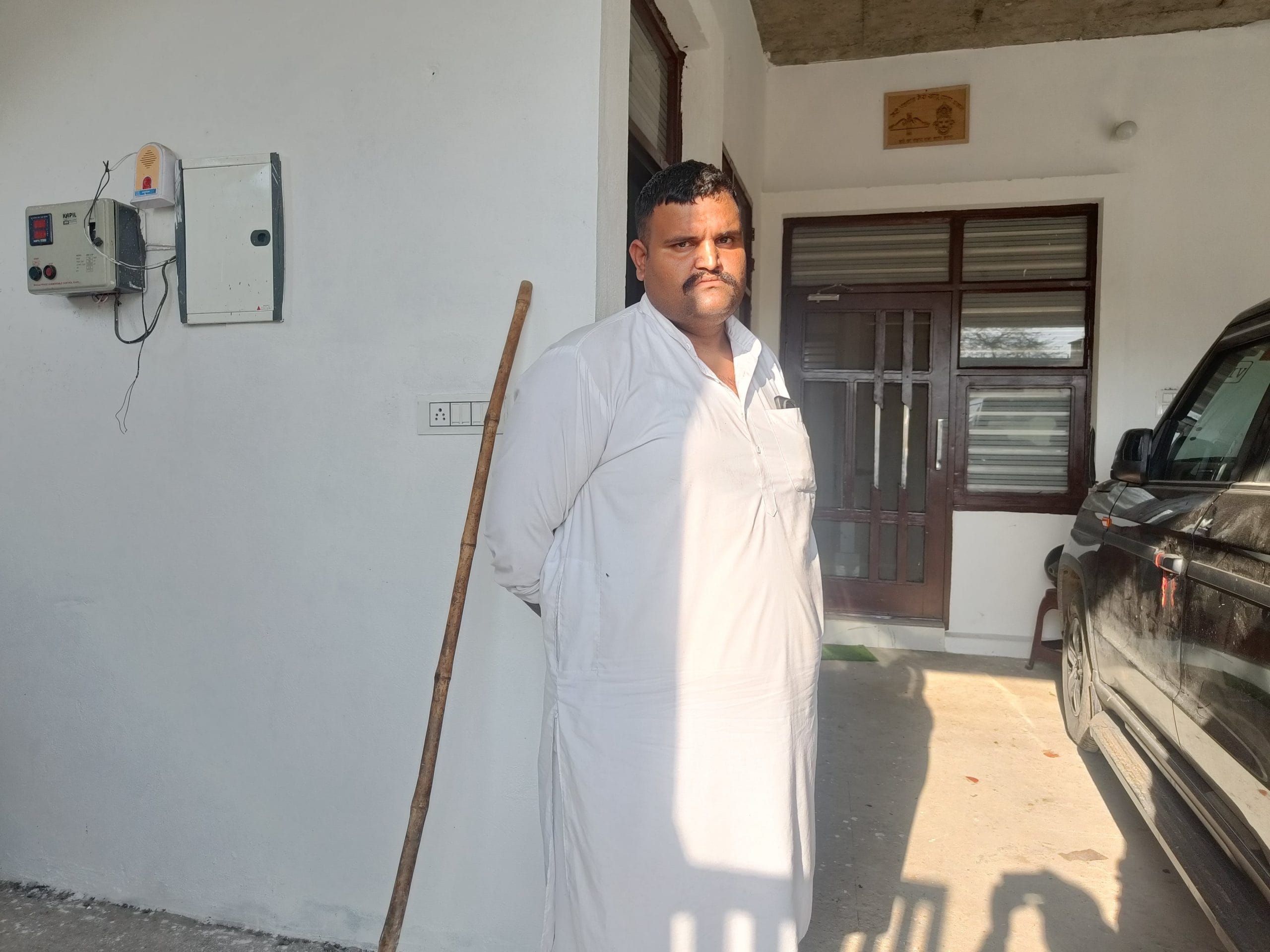
“Action will be taken against the agent. And if needed, he will be arrested as well,” said Assistant Sub-Inspector Laxman Singh, Madhuban Police Station.
The family sold 2.5 killas of land, but it’s unlikely that they’ll get the ‘investment back’.
And they’re not the only ones who’ve come to this realisation. Sumit Singh from Bassi village in Karnal, has also lodged an FIR against tout Pradeep Rana and Vikram Singh, who introduced Sumit to him, at Assandh Police Station. The tout demanded Rs 40 lakh from Sumit in the name of sending him to the US.
Sumit paid him Rs 8 lakh in cash—the advance from selling off 1.5 acres of land. On 25 January, he entered the US from Mexico and was caught by the US Army at the border. He was deported to India on 5 February.
Every FIR is an iteration of the same story. The victims didn’t have the educational qualifications, skills, or sponsors to apply through legal channels. With no job opportunities in their small towns and villages, they put their trust in touts.
Every FIR is an iteration of the same story. The victims didn’t have the educational qualifications, skills, or sponsors to apply through legal channels. With no job opportunities in their small towns and villages, they put their trust in touts.
Now, they’re panicking. Social media has been buzzing with photos and reels of deportees talking about their broken dreams and treacherous travel. “26 May Delhi Airport, 31st July USA border crossin, 3 months in American Jail, 23rd October deported to India. Dream not complete,” one post reads.
Frustrated and in debt, Daler Singh (37), a resident of Salempura village in Punjab’s Amritsar, filed a complaint against his tout, Satnam, on Friday morning.
“I called my agent and asked him to return at least Rs 40 lakh out of the Rs 60 lakh I gave him, but he started threatening me,” Singh said, sitting on his cot as his wife brought him tea.
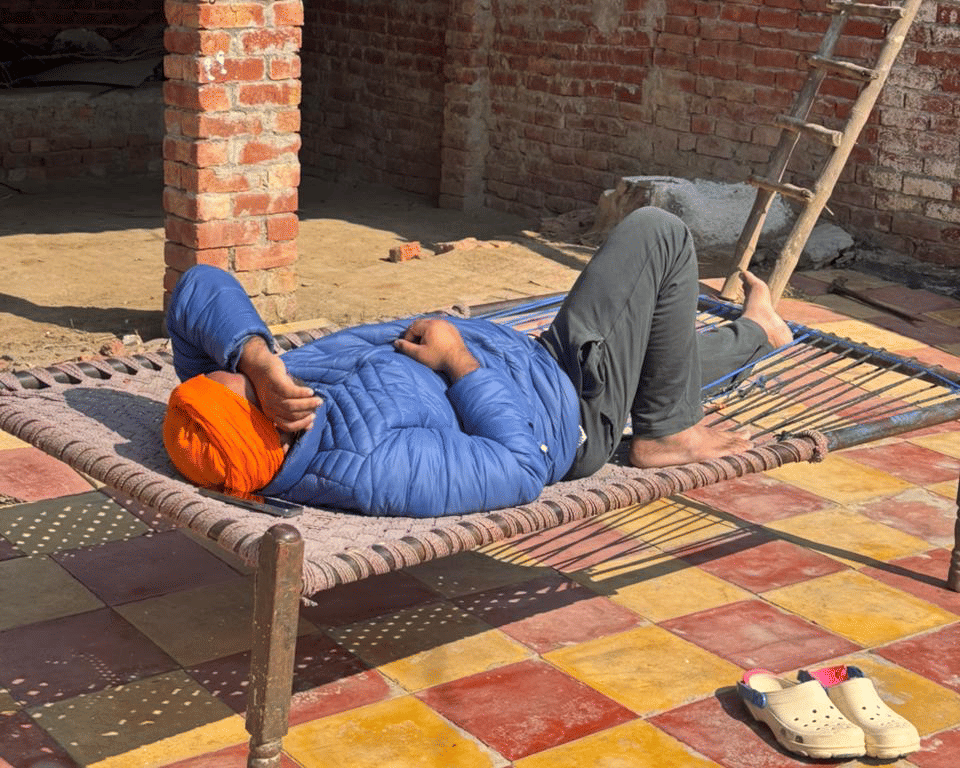
Satnam threatened Daler, claiming to have good relations with the police. But the desperate Singh didn’t care about Satnam’s threats and went ahead with the complaint.
The Rajasansi Police Station registered an FIR under Section 318(4) of the Bharatiya Nyaya Sanhita (BNS), 2023 and Section 13 of the Punjab Travel Professionals Regulation Act, 2014.
It stated that Daler Singh was introduced to the tout by a relative. “The agent made a deal to send me to America for Rs 60 lakh. I gave Rs 5 lakh to Satnam as an advance, and gave my passport to him,” read the FIR.
Satnam first sent Daler to Nigeria, but he had to return as he couldn’t secure a further flight. The tout then sent Daler to Dubai, and then to Brazil. At the time, Daler’s wife, Charanjit Kaur, paid Satnam Rs 15 lakh to facilitate further travel. After that, the process of sending money—both in cash and via Google Pay—continued until Daler finally reached Mexico and then the US.
The police launched a raid at Satnam’s house in Kotli Khaira, but he had already fled.
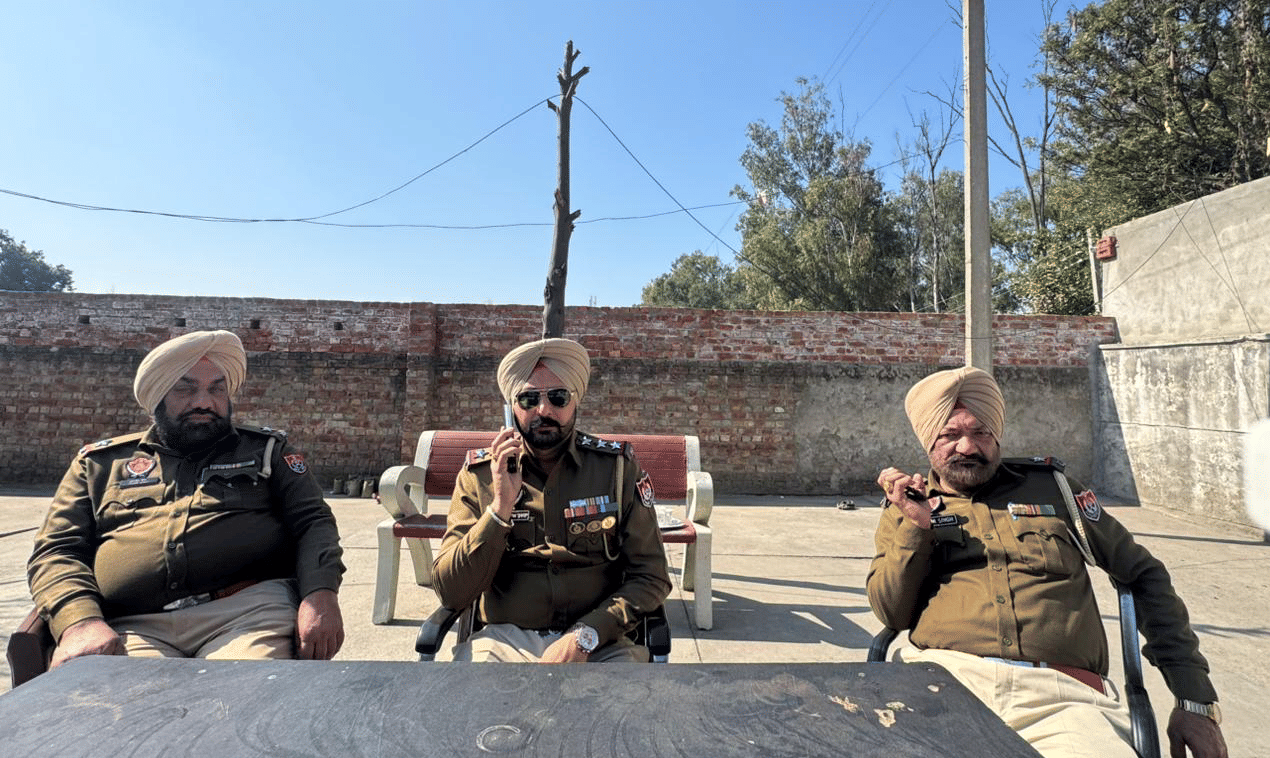
“We went to his old office in Daburji on Jalandhar Road, but he has permanently closed it. We also went to his house, but he is absconding. We have circulated his photo across Amritsar and Jalandhar,” said DSP Sardar Inderjeet Singh.
He added that the police have enlisted the help of the cyber and technical teams to trace the touts operating in Amritsar.
Daler stated that Satnam is now calling him from unknown numbers, asking him to accept half the money and withdraw the complaint. However, Daler refuses, saying he feels duped and humiliated.
Also read: I risked everything for America—confinement, torture: Robin Handa returns to Haryana
Touts in hiding
Touts like Jalandhar and Satnam are not even middlemen. They’re the lowest rung in a complex network that spans India, Africa, South America, and Mexico. Above them are middlemen who operate out of New Delhi, Mumbai, and other cities. The top bosses live in Dubai, Saudi Arabia, and even Mexico.
They offer a shortcut to the American and Canadian dream. No IELTS or TOEFL. No degree. No paperwork. But their path to the US and Canada is long and treacherous.
A former tout who left the business said he didn’t make much money.
“There’s competition among dunki agents now. There are just too many of them. To get a single client, you have to pay multiple middlemen, and in the end, you’re left with only a lakh or two,” he said.
Jalandhar, the tout that the Ranas hired, had promised the family that Akash would fly to America. “Later we found out that he too would be made to go through a dunki route. But so much time and money had been spent that there was no turning back,” said Shubham. “This was the biggest mistake of our life. We could have started a business in India with 65 lakhs.”
In his village, people gathered to discuss their plan of action. Many are worried about their sons who are on the dunki route, but the touts have no answers.
“The amount of pressure that family members have put on us in two days has never happened before,” said a tout hiding in Karnal. He didn’t expect the US government to act so swiftly. In the ten years that he’s been in the business, he’s never experienced such a complete shutdown. Families who were willing to risk starvation and possible death to reach the US are now giving up on the dream.
Also read: UK-Brazil-Colombia-Panama-Costa Rica-Mexico-California—route a deported Indian took to reach US
Police tighten the noose
Across Punjab and Haryana, police have intensified their crackdown on touts, which began several weeks ago following rumblings in the US.
Almost a fortnight ago, the Jalandhar police arrested a tout in possession of half a dozen work visas to the US. But the accused, who went by the alias Satpal, was just a cog in a larger network of immigration touts operating across Punjab and Haryana, said a police officer from Jalandhar who did not want to be named.
His arrest led to the discovery of several more touts working in Jalandhar and Amritsar, yet their real boss remains elusive. “He’s sitting in Dubai, out of our reach. He communicated with them solely through WhatsApp calls and messages,” the police officer added.
Teams are reaching out to the families of the illegal immigrants who were deported in an attempt to track down the touts.
Trump has ended our work overnight. He has put us in a financial crisis.
Dunki agent from Karnal
It’s usually the mukhbir (informer) who alerts the police about these touts. They’ve also been investigating complaints from victims who failed to reach the US and are now demanding their money back.
“We track their phone numbers and inform the cyber police as well. Even if their phone numbers are switched off, we can still trace them. Once confirmed, we launch a raid at their places,” said a senior police official.
After the recent deportation, the police officials said that they have received instructions to tighten the noose around these touts. “We are creating more informer networks to catch these agents,” the officer added. And this time, they have the support of villagers.
The tout who is hiding in Karnal does not know how he will earn money now, without the trust of local residents, or if he will land up in jail.
“Trump has ended our work overnight. He has put us in a financial crisis,” he said.
Also read: India can’t overlook Trump’s drastic MAGA steps
Agents under suspicion
The upscale Ranjit Avenue in Amritsar is lined with billboards of immigration centres, each selling a dream—a new life in Canada, New Zealand, the UK, Australia, and the US. But on Thursday, all the offices were vacant.
“Even licensed and registered agents are now being viewed with suspicion. This deportation has created panic among clients,” said an agent, sitting in her cabin in Block B of the Ranjit Avenue market. She spent the better part of the day assuring anxious parents calling in to find out if the immigration services they offered were legitimate.
Business had already taken a hit with the increasing tensions between Canada and India, rising visa rejections, and the Justin Trudeau-led government’s strict immigration policies.
This had shifted the focus to the US, said an Amritsar-based agent. Any client looking to reach Canada through illegal routes was told that the US was a better option in terms of quick money, lifestyle, and standard of living.
The recent deportation could be the last straw, multiple agents said.
There will be an impact on the industry for some time, but after that, it will return to its true form. What Trump has done is absolutely correct.
Rajat Narang, founder, Dollar One Consultancy
Karnal’s Mughal Canal Road, a hub of IELTS coaching and travel agencies, is equally deserted. At 4 pm, there are just a handful of students at institutes offering IELTS courses.
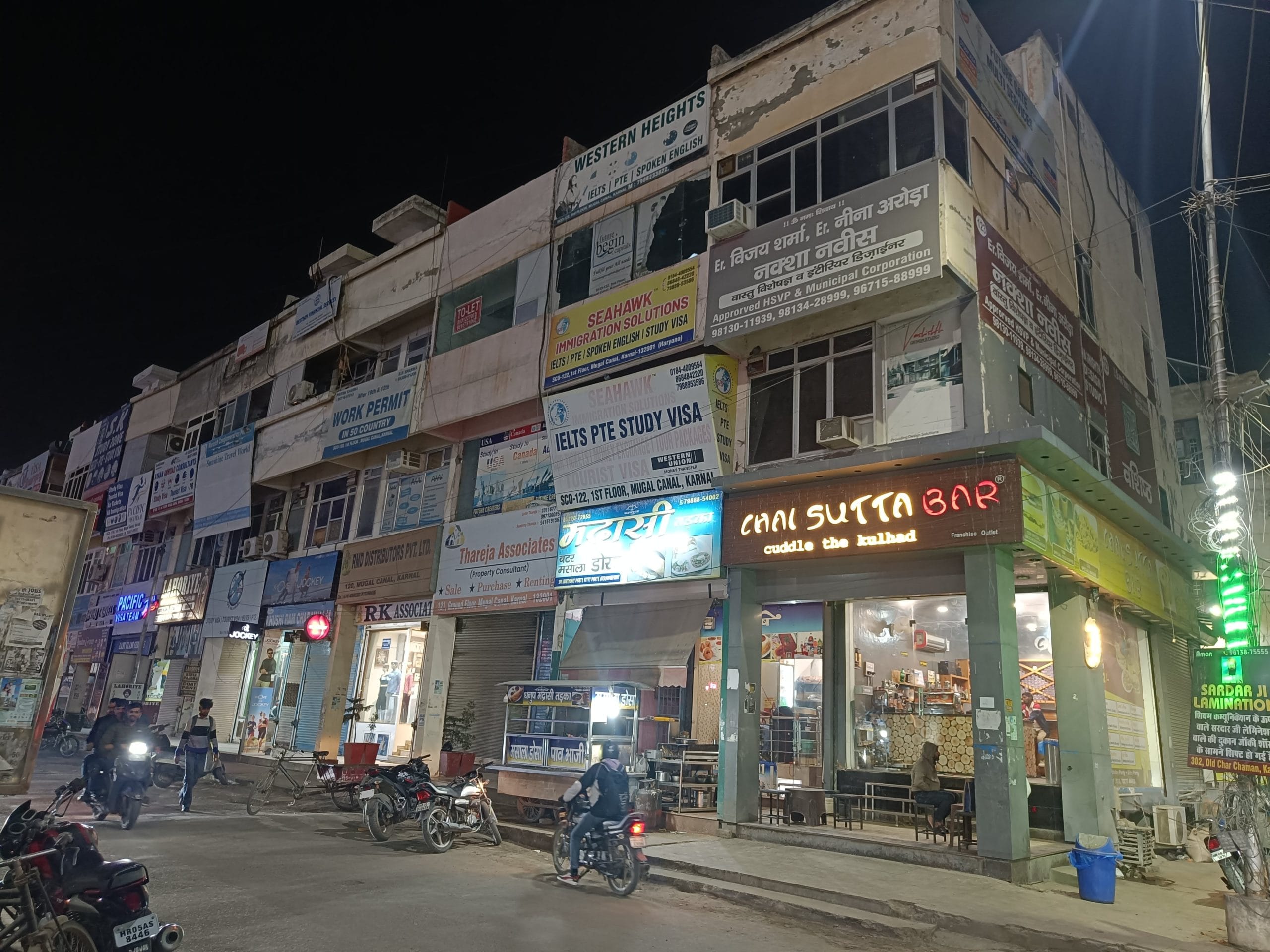
There was a noticeable drop in clients just a few months before Trump came to power in the US, and now it has become worse.
Rajat Narang, who opened Dollar One Consultancy in Karnal a year and a half ago is trying to recover his costs. He left his job in the banking sector to cash in on the golden goose that is the immigration sector. According to data from the external affairs ministry, almost 10 lakh people migrated from Punjab and Chandigarh between 2016 and February 2021. Essentially, 1 in 33 Punjabis moved abroad in this duration.
“The dunki business has almost destroyed our entire industry and has turned immigration into a negative word,” he said.
The industry started getting affected toward the end of 2023, and it has gotten progressively worse.
“We used to convert 30 to 40 per cent of the inquiries into customers, but today this figure has come down to just 4-5 per cent. No one is able to make a profit,” he added. Canada, Australia, and the US have tightened their immigration laws.
Visa rejection has soared in the post-pandemic era across Australia, New Zealand, and the UK. India’s global ranking on the Henley Passport Index also dropped from 80 to 85. According to a report, visa rejection rates were 16.32 per cent in the US, 17 per cent in the UK, 30 per cent in Australia, and 32.45 per cent in New Zealand in the last 12 months.
But Narang sees a silver lining in all this. He’s convinced that with the touts going underground, and the recent deportations, families will start approaching legitimate agencies like his.
“There will be an impact on the industry for some time, but after that, it will return to its true form. What Trump has done is absolutely correct,” he said.
Ajit Singh, who has been running GRD Overseas for 17 years in Karnal, concurred. The consensus is that the deportations will not affect legal services in the long run. Singh has little sympathy for the illegal immigrants and their families.
“Those who take the dunki route know that they are entering a country illegally. But now they are calling themselves victims, saying that the agents cheated them.”
(Edited by Prasanna Bachchhav)



